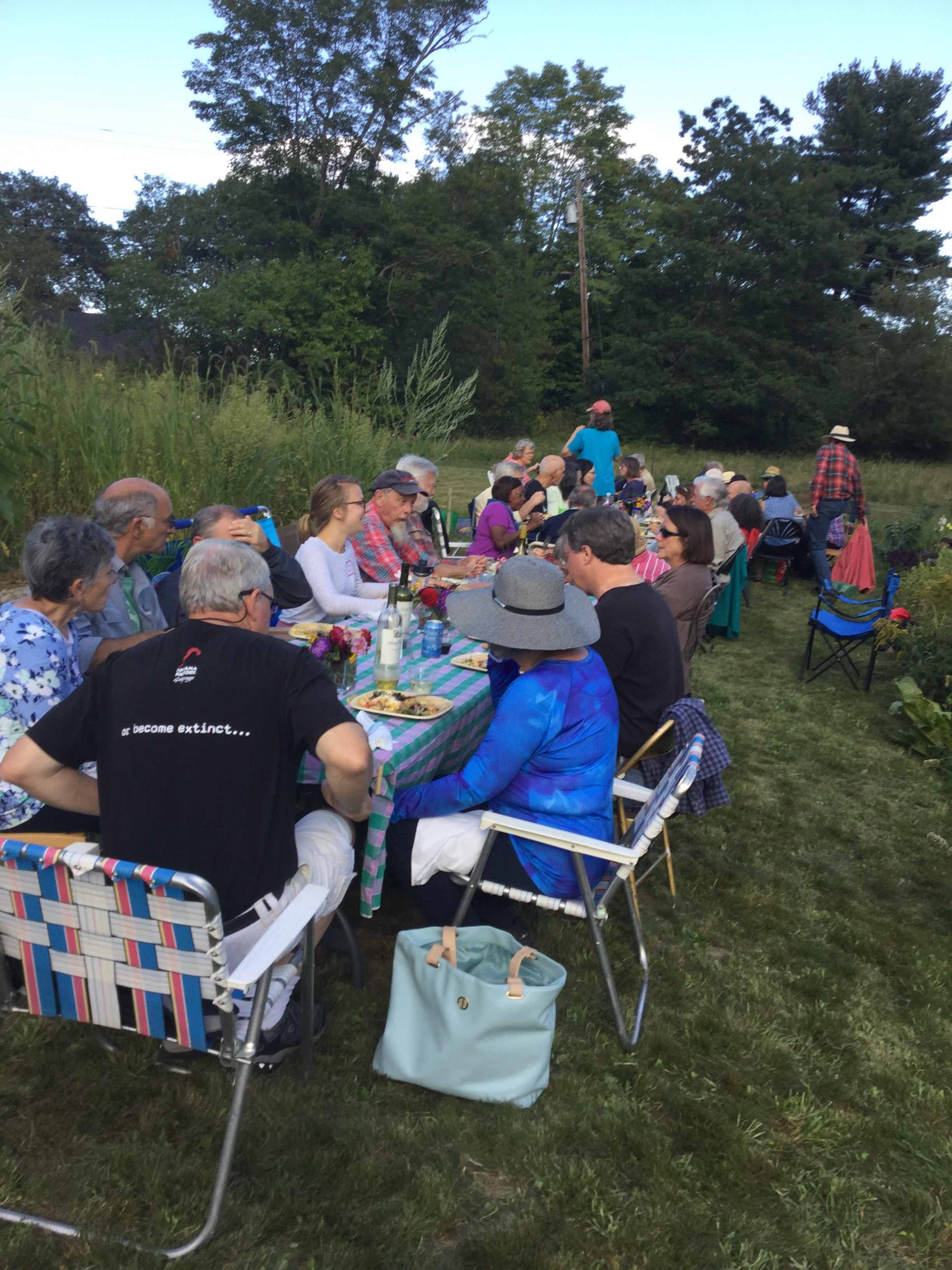
Conservation
Our Properties
Historic Harrisville is dedicated to protecting critical land in and around the mill village by means of establishing conservation easements or outright purchase. Below is a list of properties conserved by Historic Harrisville.
Zophar Willard Woods
In the fall of 2019, Historic Harrisville purchased approximately 58 acres of land in Harrisville from the Petersen family for conservation. Planning for this property is just beginning, and we look forward to engaging with our supporters and partners on this in the coming year. As a first step, we would like to acknowledge the history and significance of the woodlot, which has long been associated with the woodenwares industry nearby.
Zophar Willard lived his entire life in (the area now known as) Harrisville. He was born in 1828 to Levi and Irene Willard who lived in Pottersville (Dublin). By 1850 he still lived on his family farm. In 1853 he married Betsey Culver and the young couple purchased a woodlot, later acquiring a 12-acre farm in 1855. Their first child was born in 1856.
By 1860, Willard was employed as a teamster, transporting goods (likely timber) from one location to another. In 1865, Zophar Willard became half owner of Amos E. Perry's woodenware factory, located at the southeast corner of the intersection of Main Street and Hancock Road (known to most as the site of the former Winn Chair Shop). To provide materials for their enterprise, Perry and Willard purchased extensive tracts of land, as well as lumber rights on the land of others. In 1869, Willard purchased most of the assets owned by A.E. Perry, including this property.
In 1870, Willard was identified as a clothespin manufacturer. He had moved into the village, residing at 15 Main Street with his wife and three children. No servants or boarders lived with them in the household.
In 1873, Willard took Silas Atwood as a partner in the woodenwares business. At this time the enterprise consumed 25,000 board feet (or 1,000 cords) of lumber each year to produce 15,000 wooden boxes containing 800,000 wooden clothespins. Willard continued to purchase land and lumber rights to provide materials for his factory, known then as Willards Mills.
In the early 1870s, Zophar Willard served a brief term as Selectman for the newly incorporated town of Harrisville. In 1880 he conveyed what is now the town spring to the Manchester & Keene Railroad Company. That same year his family built a new house at 29 Main Street in Harrisville. Because he owned a lot of land in town, Willard played a significant role in how the outlying areas of town developed, subdividing and selling many parcels around the community. Between 1853 and 1896, Zophar Willard acquired 44 properties in or adjacent to Harrisville, and sold 63 at least tracts in the town.
Willard was also a member of the firm Colony, Craven and Company, which operated (but did not own) the Harris mills in the late 1870s and early 1880s after the death of Milan Harris and before they were acquired by the Cheshire Mills Company. This business venture ended abruptly with the fire that destroyed the brick "middle mill" in 1882.
Despite his professional success, Zophar and Betsey Willard suffered the loss of two of their children in this era. Their youngest daughter, Fannie Belle Willard, died in Boston at the age of 21 in 1886. Their son, Levi A. Willard, was sent to Texas to be treated for "consumption" (tuberculosis), but died in 1888 at the age of 26. Only their eldest daughter Addie E. Harris survived to adulthood. After a full and successful life in Harrisville, Zophar Willard died in December of 1899 of "apoplexy" (unconsciousness resulting from brain hemorrhage) after falling from his wagon. The Willard family is buried in Island Cemetery, overlooking their family home(s) on Main Street.
During his 71 years in Harrisville, Zophar Willard worked hard and found success related to both the agricultural and industrial history of our community. The property now being named Zophar Willard Woods is just one of many large tracts owned by Willard associated with his woodenwares business, but it is perhaps the most closely related due to its close proximity to the site of Willards Mill (later Winn Chair Shop). Historic Harrisville is pleased to conserve these woods for the community.
Mosquito Bush
In 2004, Historic Harrisville purchased the land and former mill sites upstream from Harrisville village. The sites comprised the tiny industrial village known as Mosquitobush, where waterpower turned the machinery for small woodworking mills until the late 1930s. These seven acres lie between Lake Nubanusit and Harrisville Pond. They are a wildlife habitat for otter, moose, weasels, birds, amphibians, and reptiles. The Harris Center for Conservation Education holds a conservation easement on the land.
Chesham Road Gateway
In late October, Historic Harrisville purchased another property, located on the right side of Chesham Road as you enter the village from Chesham. By conserving what we are currently referring to as the Chesham Road Gateway property, we will be protecting the edge that helps to define the National Historic Landmark village.
Bollerud Easement
In 1987 Historic Harrisville established its first conservation easement, 28 acres of privately owned hillside land above the village. They offer a grand view of Mount Monadnock.
Johnson Field Easement & Harrisville Community Garden
This triangular field, located at the eastern entrance to the mill village, has been owned and protected from development by Historic Harrisville since 1988. In 2009, New Hampshire Master Gardener Deirdre Oliver decided to establish a community garden in Harrisville. She felt the ideal location was a sunny, protected piece of open land owned by Historic Harrisville (HHI) just outside of the National Historic Landmark village. Exceeding Deirdre’s initial goal of having 12 gardeners, 20 plots were laid out and used that year.
The first-year gardeners began to dig, and the clinking sound of shovels hitting rocks could be heard across the neighborhood. The discarded stones, some boulder sized, became a “stone mountain” near the new driveway. But as Oliver foresaw, the soil itself showed promise for fruits, herbs, vegetables, and flowers.
This community venture was supported by funding from the Harrisville Community Fund and the UNH Extension Service, with additional private funds and in-kind contributions from local residents. When the garden site needed an initial plowing, Jay Jacobs arrived with his tractor. David Kennard designed an electric critter fence for the garden perimeter and sold it to the community garden at cost. Craig Thompson delivered manure and hay from Mayfair Farm.
Providing a ready water supply was a major challenge. Initially, neighbors Heri and Solveig Tryba, and Joan Miller allowed gardeners to fill their watering cans. Then, the Harrisville Fire Department brought a temporary water tank, loading it with water pumped from a local stream. When those measures proved inadequate, a 12-foot-deep, gravel-filled cistern was dug to collect rainwater, which fed two hand pumps strategically placed inside the garden.
When the gardeners needed a shed to house tools, a fortuitous solution developed. Having just removed two giant pine trees from his property on Main Street, Rex Baker donated the logs to the community garden. Jeff Trudelle milled them into board lumber. The following year, when the wood was sufficiently seasoned, architect Tom Weller designed the perfect shed and helped construct it with Scott Oliver, Les LaMois and Doug Walker.
Over the past decade, the community garden has expanded to 46 plots, accommodating new gardeners who enjoy growing their own food. Participants gather for scheduled workdays to mow and rake the site. And, each week, Beth Healy coordinates the sharing of surplus vegetables with families in need, via the Community Church of Harrisville and Chesham.
At the end of each summer growing season, the gardeners hold a community potluck along the grass fairways between rows of plots to enjoy and celebrate the community that has been supported by the garden. Humbly, founder Deirdre Oliver says, “The garden took on a life of its own. I only provided the spark.”







